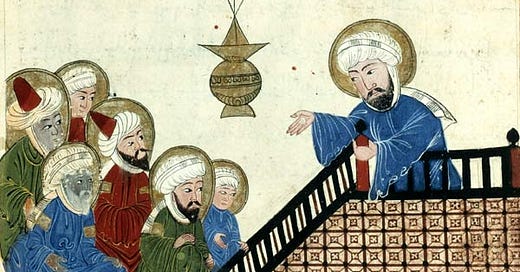A hopeful introduction to Islam
Review of No god but God: The Origins, Evolution, and Future of Islam by Reza Aslan
If you are looking for a primer on the basics of Islam, this book is a good place to start. While conscious of the many problems that modernizing Islam would entail, Aslan makes the case for reform. Perhaps this is naive, but there's no denying that it is needed and indeed not impossible.
The bulk of the book is about the origins of Islam. Aslan's description of the religious communities during the 7th century on the Arabian peninsula is of great interest: they included Jews, Christians, a wide variety of other monotheistic sects, and a loose group of polytheists, all of whom congregated around Ka'ba, in Mecca. Muhammad was a business man, a minor actor in a prosperous tribe, who made much of his fortune by his marriage to an older widow, Khadija bint Khuwaylid. Khadija was unusual in that she carried out her business herself. After a number of prosperous years, Muhammad received a revelation from angel Gabriel, who spoke to him in poetry and designated him as the prophet of God. The original doctrine placed Islam squarely in the same tradition as the other monotheisms, tolerant of them, though opposed to idol worship and polytheism. This set him on a collision course with the tribe (the Quraysh) that controlled access to the Ka'ba, a great source of wealth and prestige. To avoid assassination, he and a small band of followers escaped to Medina. As his army grew, the Quraysh were defeated militarily and Muhammad returned to Mecca, dying soon thereafter.
At that point, the Quran was not written down, but was instead a collection of sayings circulated in the oral tradition. A successor collected them into a book, at the moment that Islam became an empire and established an orthodoxy as administered by a clerical elite, the Ulama. It is at this point, Aslan implies, that the original religion begins to become calcified and inflexible, less eclectic and accepting of other traditions, though for centuries it was more tolerant of the other monotheisms than the Christian empires were.
The 5 pillars of Islam were established: Shahada (faith); Salah (prayer); Zakāt (Charity); Sawm (fasting at Ramadan); and Hajj (pilgrimage to Mecca).
Aslan then brings us very briskly to the present. For centuries, he argues, Islam has proved unable to reform itself, largely because the Ulama has sought to enforce orthodoxy. There was also the schism of the Shi'ia, which occurred during an early transfer of power that entailed the murder of Ali, one of the last close descendants of Muhammad. In addition, Sufism arose, a mystical wing of Islam that is for obscure reasons indefinable.
Throughout the book, Aslan has a somewhat defensive tone: Muhammad's original tolerance and open-mindedness has given way to militant rigidity. Aslan is a pains to argue that only Islamic fundamentalists espouse the interpretation of Islam as a violent war against infidels and the unfaithful. This is one interpretation of Islam and so far as it goes, a valid one, but his case for a modernized version is weak, unless one's time scale is centuries, certainly beyond our lifetimes and the current political crisis.
I do believe in the potential of Islam to reform, that it must come from within rather than be imposed from a foreign source and that the military opposition to it essentially hinders the internal process from advancing. However, the road will be so long and hard that I think Aslan fails to come to grips with the rot and corruption that he exposes. That being said, his perspective is valuable, optimistic, and respectful. He genuinely believes that Islam is ready to embrace change, that a majority of Muslims accept this, and that the fundamentalists cannot stop it. Who am I to say no? Perhaps he is right.
Finally, Aslan is a beautiful writer. Each chapter begins with a vivid, if perhaps fictionalized, description of the experience of historical figures as well as his own on return to his Iranian birthplace during a period of loosening of the regime. It is a pleasure to read.



